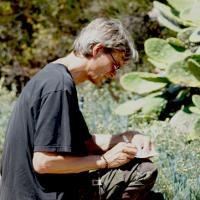
Biodiversity Reading time 5 min
Bruno Fady, pleasure is Genetic
Published on 27 June 2016 (date.last_update 28 April 2021)
Identifying the genetic mechanisms involved in adaptation
After completing an undergraduate degree in cellular biology and plant physiology, Bruno Fady put his studies on hold for two years to follow his future spouse to the U.S., where she pursued hers. Upon his return, his scientific interests changed. Mr Fady turned to ecology and genetics and discovered INRA (now INRAE) during an internship completed for his Masters degree. He was immediately taken with the Institute’s commitment to provide precise scientific answers to societal issues. His doctoral thesis looked at adaptation of the Greek fir to French Mediterranean conditions. The subject was entirely in synch with a priority issue for INRA and for forestry managers in 1990: the search for alternative forest species to diversify and increase productivity in French Mediterranean forests, which are easily affected by fires and pests. Bruno obtained his doctorate in genetics and ecology from the University Paul Cézanne Aix-Marseille, and joined INRA in 1992.
Genetic diversity: fuel in the engine of evolution
While continuing his research in genetic improvement, Mr Fady soon took an interest in the conservation of genetic diversity found in natural forests, among individual trees and among populations. “Diversity is the fuel in the engine of evolution. It allows adaptation, in particular to climate change,” stresses the scientist. These issues are at the heart of research currently underway at INRA’s Mediterranean Forest Ecology Unit (URFM) in Avignon, France, where he is Deputy Director. He studies the Mont Ventoux experimental site, to determine whether the magnificent forests there will disappear by 2100 or whether their genetic diversity will allow them to adapt, either on their own, or with a little help from science – and especially genetics. “We’re trying to correlate genetic variability in a population with the environmental conditions in which it grows. Our goal is a tough one: in the long term, we need to identify the genes, characteristics and mechanisms involved in climate adaptation,” explains Mr Fady. His research is not limited to Mont Ventoux. “Significant biological diversity exists among species found in the Mediterranean region. We attempt to describe how their genetic diversity, the product of a complex process, is spatially structured. This biogeographical description will allow us to take decisions in the area of genetic diversity conservation,” said Mr Fady. He added: “This research provides us with information about the past that helps us understand the present and predict the future. Without this knowledge, we cannot propose management strategies to decisionmakers and project managers.”
GenTree: combining conservation and sustainable use of forest genetic resources
In March 2016, Bruno Fady became the project coordinator (Administrative and Scientifc Manager) of GenTree, a European research project within the Horizon 2020 scheme. The project brings together 22 partners, including INRA, for a period of four years. The goal is to develop methods and tools for the forestry sector to improve conservation and use of genetic diversity. “This is a very important project. It aims to combine approaches to conservation and the sustainable use of genetic diversity to better manage forests at the European level in a context of profound changes to the climate and to societal needs.” And lastly: “We can successfully adapt our forests to a changing world if those who work to conserve biodiversity also accept to use methods developed for genetic improvement, and if those who seek to make forests more productive also take a look at what’s happening in the field of conservation, far removed from attractive production forests.”
.
- 60 years old, married, three children
- 1982 Undergraduate degree in cellular biology and physiology, Université Paris 6, France
- 1986 Masters in Ecology, University Aix-Marseille 3, France
- 1990 Doctorate in Ecology and Genetics, University Aix-Marseille 3, France
- 1991 Post doctorate, Institute of Forest Genetics, USDA, California, USA
- 1992 Research Engineer, INRA, Bormes les Mimosas, France
- 2000 Research Scientist, INRA Avignon, France
- Since 2007 Research Director, INRAE Provence Alpes Côte d'Azur, France
- Since 2014 Deputy Director of INRAE’s Mediterranean Forest Ecology Unit (URFM)
